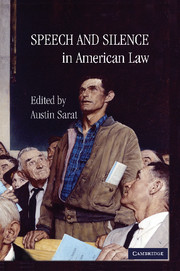Book contents
- Frontmatter
- Contents
- Contributors
- Acknowledgments
- Introduction: Situating Speech and Silence
- 1 “Our Word Is Our Bond”
- 2 Powell's Choice: The Law and Morality of Speech, Silence, and Resignation by High Government Officials
- 3 Anonymous: On Silence and the Public Sphere
- 4 Freedom of Expression, Political Fraud, and the Dilemma of Anonymity
- 5 Speech, Silence, the Body
- Index
- References
4 - Freedom of Expression, Political Fraud, and the Dilemma of Anonymity
Published online by Cambridge University Press: 04 August 2010
- Frontmatter
- Contents
- Contributors
- Acknowledgments
- Introduction: Situating Speech and Silence
- 1 “Our Word Is Our Bond”
- 2 Powell's Choice: The Law and Morality of Speech, Silence, and Resignation by High Government Officials
- 3 Anonymous: On Silence and the Public Sphere
- 4 Freedom of Expression, Political Fraud, and the Dilemma of Anonymity
- 5 Speech, Silence, the Body
- Index
- References
Summary
Introduction: The Right Not to Speak as the Right of Expression
One of the long-accepted paradoxes of both the doctrine and theory of free expression is that the constitutional right to speak subsumes the constitutional right not to speak. A closer look at the underpinnings of the right not to speak, however, makes clear why it is properly thought to fall within the bounds of the First Amendment's guarantee of free expression. Governmentally compelled expression breaches the wall between government and individual that is essential to the viability of a liberal democracy. It therefore undermines the values fostered by free expression in a variety of important ways.
A traditionally recognized subcategory of the constitutional guarantee of silence is the right of anonymity – in other words, the right not to reveal one's identity when exercising one's affirmative right to express oneself. In one important sense, of course, the right of anonymity qualitatively differs from the right not to speak. While the latter could be construed to apply to a generic right to keep silent, the right of anonymity represents an expressive hybrid. It applies when and only when one first chooses to speak, write, or associate for political purposes. The right of anonymity, then, is a selective form of expressive silence: it is only when the speaker first affirmatively chooses to speak that this form of silence comes into play.
- Type
- Chapter
- Information
- Speech and Silence in American Law , pp. 143 - 171Publisher: Cambridge University PressPrint publication year: 2010
References
- 1
- Cited by



